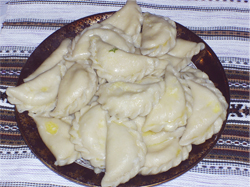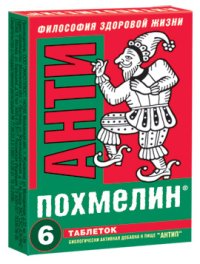Categories: "Food"
Вареники (часть первая)

Вареники is a traditional Ukrainian dish which is also very popular in Russia. They are dumplings that can be stuffed with potatoes and mushrooms картошка и грибы, cabbage капуста, cabbage and mushrooms капуста и грибы, fish рыба, meat мясо, liver печёнка, cherries черешня, or strawberries клубника. The stuffing possibilities are endless which makes this dish unique because you can individualize each вареник perfectly for yourself.
Occasionally my mother makes вареники. Her favorite stuffing ingredients are potatoes and mushrooms, cabbage and mushrooms, and cherries. When we have company, she often makes this dish for the guests and at the end of the day, she happily announces «Гости съели все вареники!» “The guests ate all the dumplings”. My mom has altered the recipe slightly by deep frying each dumpling to create a crispy shell a crunchy taste. These dumplings are usually served with sour cream сметана, fried onion жареный лук, or melted butter расплавленое сливочное масло. My mouth is already starting to water as I describe this tasty dish!
Похмелье
Every American college student should go to Russia. It's just such a great experience. Russian friendships are intense. The Russian countryside is gorgeous. Astonishing museums and architecture. There are beautiful churches in which to pray and contemplate what good works we might like to accomplish over the next year. Ah, such opportunities! So why is it that those American students always end up drinking obscene amounts of vodka, throwing up at the Tomb of the Unknown Soldier, singing “Rubber Ducky” with a German accent in the middle of Red Square at three in the morning in the company of some Russian ballet dancer they've been flirting with since eight in the evening at the Irish Bar on the Arbat? And in the morning they wake up with похмелье, a hangover.
A smarmy American might even suggest that we have a spiritual obligation to get at least one hangover in Russia since the Primary Chronicle quotes Vladimir the First as rejecting Islam because the Russians love to drink, and thus to really get into the spirit of Russian language study, you have to tie one on. Wow, a little education and we can justify just about anything.
“I have a hangover” in literary Russian is «У меня похмелье» or «Я с похмелья». Notice that с here is followed by the genitive case, not the instrumental. It is incorrect to say «Я с похмельем». You'll also hear the more conversational «Я с бодуна», which means the same thing. Here are a couple sample sentences:
| Я по субботам работаю с похмелья. | On Saturdays I work with a hangover. |
| Почему с похмелья люди сильно и много чихают? | Why do people with hangovers sneeze so much and so strongly? |
Actually, I doubt hangovers have anything to do with sneezing. Probably they just encountered a drunk with a cold.
You might think that people would battle hangovers with the obvious solution: sobriety. Nope. There is an incredible wealth of material out there discussing the question «Как опохмелиться наилучшим способом?» “What is the best method to cure a hangover?” More precisely, the verb опохмеляться-опохмелиться mostly means “to treat a hangover by using more alcohol,” or as some people say in English “to take a hair of the dog that bit you.”
Russians can discuss this question for hours and hours on weekends… weekends with bloodshot eyes and aching heads and the taste of dachsund fur and horseradish in their mouths. There is even a website devoted to the issue. Here is an actual answer to the question I found on the web:
| Как опохмелиться наилучшим способом? | What is the best method to cure a hangover? |
| хм....серьезную тему для обсуждения поднял товарисч....сложно даж так сразу ответить...скажу одно, что нажравшись в жопу, с дикого похмелья мало что поможет...сказки по типу выпить бутылку пива- полный бред...мне нравиццо кефиром, хотя уж не всегда помогает, я считаю лучше всего не доходить до похмелья, т.е. пить перед нажираловкой АНТИПОХМЕЛИН, 3 таблетки перед нажираловкой, и скоко ни пей будешь как огурчик... оч рекомендую, вещь реально действует (source) | hm... the komrade raised a serious issue for discussion... it's hard to come up with a quick answer... i'll just say that once you've gotten drunk off your ass and have a raging hangover not much can help you... stories like “drink a bottle of beer” are complete fantasies... i like 2 use kefir, although it doesn't always help, and i think the best way is to not get all the way to the hangover, i.e. before getting down to the heavy boozing take Antipokhmelin, three tablets before saucing up, and no matter how much ya drink, you'll be fit as a fiddle... v m recommend, stuff actually works |

The guy's spelling suggests he was actually writing with a hangover «он писал с похмелья». I thought he was making up the Антипохмелин, but apparently it's a real product. You can see a picture of it at the right.
Помидор
The Russian word for tomato is помидор, as in «На балконе я посадил помидоры» “I planted tomatoes on the balcony.” Russians make great use of their apartment living space, so I've seen all sorts of plants being raised on balconies in the summer time in Moscow.
Of course, once you talk about tomatoes, you have to talk about tomato sauce. How would you go about putting together a phrase like that in Russian? In English it is common to put two nouns in a row with the first modifying the second, like in "city park." Russian mostly doesn't do that: normally the first word has to be put into adjective form. To make the adjective, you start with the stem of the noun, add an adjectival suffix and case endings. For instance:
| Noun | Adjective | Example phrase |
| стол | столовый | столовая ложка tablespoon |
| чай | чайный | чайная ложка teaspoon чайный гриб tea mushroom |
| город | городской | гороской парк city park |
With that in mind, a clever student might predict that "tomato sauce" in Russian would be «помидорный соус». But alas, even though there is such a word as помидорный, the Russians almost never use it in regards to the sauce. Instead they usually say томатный соус. If you think that implies that there must also be a word томат, you would be exactly right, but the noun томат is used much less often than the noun помидор. Thus one says «Я обожаю помидоры» “I adore tomatoes” using the one root, but one says «Меня обрызгал скунс, пришлось отмываться томатным соусом» “I got sprayed by a skunk and had to take a bath in tomato sauce” using the other root. Actually, they don't natively have skunks in Russia, so that won't be a big issue for you.
| de | die Tomate |
| es | el tomate |
| fr | la tomate |
Курица

The Russian word for chicken is курица. My great-grandmother had a henhouse by her home where she kept many chickens. Although the henhouse required many hours of cleaning every week, my great-grandmother enjoyed caring for her chickens and was happy doing the work. Primarily she raised the chickens for the eggs «яйца» and meat «мясо».
Occasionally my great-grandmother killed a chicken to make dinner for the family. She owned a small ax «топор» which she used to behead the chickens. She would tell me «сейчас мы будем готовить ужин» “now we will cook dinner”. She would choose the oldest chicken and carry it to the butchering table by its neck while it screamed and scratched. With one quick strike, she executed it and I watched with sadness as the beheaded chicken began running quickly around the yard for a few seconds before dropping dead. Afterwards, my great grandmother cleaned and plucked the chicken before she prepared dinner with it. Although, I sometimes felt sad when eating the chicken that was once alive, I could never resist my great grandmother’s cooking. I told her all the time «бабушка, ты вкусно готовишь курицу» “grandmother, the chicken you cook is tasty”.
Минеральная вода
The Russian word for mineral water is минеральная вода. Before coming to America, I lived in a city called Минеральные воды which means mineral waters in English. The city is close to the Black Sea and my family visited the sea often during holidays and summer vacations.
One of the most famous attractions in Минеральные воды is the Mineral Water Park. This park is famous for its mineral water which comes straight out of the ground from a springhead «источник». Many people come to this park to drink the healthy mineral water and enjoy the green scenery. Every time my grandmother said to me «мы едем в парк Минеральных вод» “we are going to the Mineral Water Park”, I became very excited because many other children came to the park with their families and I always found children to play with. I especially loved to run around where the huge trees grew on both sides of the grassy walkway and arched over each other making it difficult for the sun to shine through. I often brought blankets with me and took naps under the tree arches. When I woke up, I would look up at the beautiful green arch and feel as if I was in a huge green tunnel. It was truly a heavenly experience.